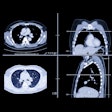
NEW YORK (Reuters Health), Oct 20 - Iatrogenic preterm delivery is common among women diagnosed with invasive cancer during pregnancy, a new multicenter study shows.
The study, published online in the Journal of Clinical Oncology, involved 215 women who received diagnoses of invasive cancers during pregnancy between 1998 and 2008.
While pregnancy outcomes were good overall, Dr. Frederic Amant of University Hospital Gasthuisberg in Leuven, Belgium, and his colleagues advise that preventing delivery before 35 to 37 weeks "appears to be an important part of the treatment strategy."
"In this study, neonatal problems were mainly due to iatrogenic, and therefore preventable, prematurity," they note.
Among the women in their collaborative study, involving hospitals in Belgium, the Netherlands, and the Czech Republic, the average age at diagnosis was 33.2 years, and average gestational age at diagnosis was 21.0 weeks.
The most common malignancy was breast cancer, in 46%, followed by hematologic malignancies in 18% and dermatologic cancers in 10%.
Treatment was started during pregnancy in 122 women (56.7%) and afterward in 58 (27.0%).
Five women (2.3%) miscarried, at an average of 10.7 weeks' gestation, before starting cancer treatment. In 30 women, pregnancies were terminated because of the cancer diagnosis, although in 4 cases, this was "medically not strictly indicated," the researchers note. "The fact that three of these four instances of pregnancy termination were treated in the same city emphasizes the need for sufficient information and education on this topic," they write.
Five children were born with major malformations and 8 had minor malformations, which was not different from the background risk, according to the article. This confirms, the researchers write, that after the first trimester, cytotoxic treatment doesn't increase the malformation risk.
Just over half of the infants were admitted to neonatal intensive care units, with prematurity being the cause in 85.2% of cases.
Labor was induced or elective C-sections performed in 71.7% of the pregnancies, with the mother's cancer usually given as the indication. Preterm labor was more common in children exposed to cytotoxic treatment; these children were also more likely to be small for gestational age.
The average gestational age at delivery was 36.3 weeks.
Overall, 54.2% of the children were born preterm. "In the vast majority (89.7%), the delivery was iatrogenically induced," the researchers said.
Citing literature from cancer researchers, the investigators point out, "Deliberate delay of therapy to achieve fetal maturity appears to be a safe option for patients with early-stage disease."
Also, they comment, "To date, treatment during pregnancy is continued until fetal viability is reached. Instead, fetal maturity should preferably be the criterion to induce delivery."
The authors predict that rates of cancer during pregnancy -- now roughly 0.1% -- are likely to increase as more women delay getting pregnant and the incidence of cancer among women in their 30s and 40s increases.
J Clin Oncol 2009.
Last Updated: 2009-10-19 16:26:22 -0400 (Reuters Health)
Pregnancy may delay diagnosis and treatment of breast cancer, February 10, 2009
Cancer treatment may raise later pregnancy risks, October 16, 2007
Copyright © 2009 Reuters Limited. All rights reserved. Republication or redistribution of Reuters content, including by framing or similar means, is expressly prohibited without the prior written consent of Reuters. Reuters shall not be liable for any errors or delays in the content, or for any actions taken in reliance thereon. Reuters and the Reuters sphere logo are registered trademarks and trademarks of the Reuters group of companies around the world.

















